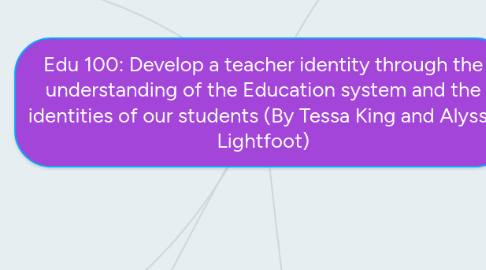
1. Classroom Management
1.1. Self-regulating approach: Adults should believe that children are worth the effort and time it takes to instill inner discipline. (PowerPoint)
1.2. Community Approach: Through classroom management we must provide students with skills they will need for life. Kohn believes we must provide Autonomy, Relatedness, and competence. (PowerPoint)
1.3. Supportive Classroom: This idea is to understand why certain students misbehave and provide them with logical consequences for their actions. (PowerPoint)
1.4. Behaviourism: Behaviour can be controlled, modified and regulated by using rewards and punishments. (Powerpoint)
1.4.1. Personal Reflection: As teachers we must develop plans on how we will deal with all different behaviours of our students in the most effective way possible.
2. The evolution of the Education system and how that effects our teaching
2.1. Ken Robinson (2010): stresses how we much change our education system in order to create more divergent thinkers. He suggests many ways to do this where children are more able to be creative. He also suggests ideas such as not basing what grade students are put in based on age. He wants to take away the idea of there being just one answer for everything.
2.2. Personal Reflection: Technology is becoming one of the most important tools used in education today. There are endless educational opportunities through technology and we are now required out use different technologies in our teaching. (Edu 210)
3. History of the Aboriginal Population
3.1. Personal Reflection: Residential schools have been a big part of the education system across Canada. Especially in Alberta where we have one of the largest Aboriginal populations in Canada. Teachers should be educated enough to teach students, Aboriginal or not, about the residential schooling, and the different methods Aboriginal people use in their education systems.
3.2. Aboriginal classroom management. Personal refection: Aboriginal peoples have a different sense of how children should be educated. They are tradition based, and value co-operation. With the growing Aboriginal population it would be beneficial for teachers to include some of these teachings in their classroom.
3.2.1. Belonging: Being a strong united group, and feeling as thought they are loved and accepted by the group. (powerpoint)
3.2.1.1. Personal Reflection: Each of these teaching effect the way in which Aboriginal children learn in a public school system.
3.2.2. Mastery: Competence in many areas of learning. Striving to do well for oneself rather then power. (powerpoint)
3.2.3. Independence: Being responsible for yourself and your actions, and working towards bettering yourself. (powerpoint)
3.2.4. Generosity: The want to help others improve, and to appreciate what others can contribute. (powerpoint)
4. The understanding of the development of students
4.1. Picture Book Philosophy (2011): College students encourage students to philosophically analyze books through asking students questions. Challenging students to think outside of the box, and to learn in a different way.
4.1.1. Personal reflection: Giving the children a chance to express their opinion makes them feel as if they are valuable. It allows them all to think in new ways and in ways that play to their strengths.As teachers it is important to incorporate different types of learning into the classroom
4.2. Personal Reflection: We are beginning to further realize the importance of embracing individuals cultures within our classroom. As a teacher we must decide to what extent we will educate about other cultures . We also must develop plans of accommodating for cultural practises in our classroom.
4.3. Personal Reflection: Students with special needs are being integrated into our schools and we are beginning to understand more and more about dealing with students with special needs
5. Professionalism
5.1. Mark Yurick (Guest Speaker): Developing a professional identity is critical in the process of becoming a teacher. Your professional identity comes from your values and beliefs, your professional repertoire of knowledge, skills and abilities, legislated framework, and your wisdom gained from experience. The ATA is a useful source in finding your professional identity
5.1.1. Personal reflection: Mark Yurick's presentation challenged us as students to start thinking about our future teaching identity and how it would be influenced
